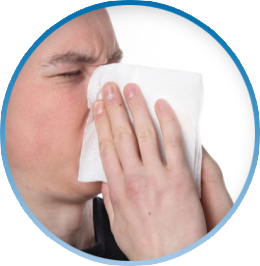Many people think that to breathe more is better. That is not the case. Of course we need to breathe to some extent but just like our eating habits – too much is detrimental to our health. Respiratory practitioners understand that the breathing rate should be proportional to our metabolic needs. When we are at rest the breathing should be less, when we are exercising and exerting ourselves the breathing should be more. However, many people breathe more air than they should when at rest. They breathe too much – this is called over breathing, or hyperventilation.
How does over-breathing lead cause allergies?
An over-breather may be breathing twice as much air as someone who has a functional breathing pattern. If those two people are both standing in a field of airborne pollen, or sitting in a dusty room full of cat dander, then the over-breather will be inhaling up to twice the amount of pollen, dust or dander than the functional breather. This may be fine for a once off but if you are going about your daily life always over breathing then at some point the body becomes over-sensitised to this allergen burden. This over burdened situation results in an exaggerated response from the immune system as it feels under attack. The response may be hayfever, sneezing, itchy eyes, eczema, dry and inflamed skin or food allergies.

Over-breathing results in hypocapnia, where the carbon dioxide in the arterial blood is lower than it should be for optimum health. CO2 is an important gas that regulates the oxygenation of every cel in our body. Low CO2 causes degranulation of mast cells which results in increased histamine production. It is histamine that causes the allergic response we experience. Improving our breathing pattern will therefore can reduce histamine production and our allergic reactions will reduce.
Allergies on the rise
Our ancestors used to die of communicable diseases such as cholera, typhoid or influenza. With modern medicine this is no longer the case and we are living longer. However there has been a sharp rise of non-communicable diseases such as cancer, immune deficiency diseases, diabetes and heart disease. This has coincided with the move away from natural foods towards heavily processed, chemically laden foods. This change in our diet is one of the influencing factors in the rising prevalence of overbreathing and mouth breathing. The chart below shows how we are breathing up to twice as much air as our ancestors a century ago. This increased breathing is partly responsible for the sharp rise in allergies.
Anti-histamines are one of the most commonly sold drugs at pharmacies. However, they are not without side effects and recent research shows prolonged use increases risk of dementia.
http://jamanetwork.com/journals/jamainternalmedicine/fullarticle/2091745
Most clients who complete the Buteyko program of breathing retraining experience significant relief in their allergic symptoms. Less sneezing, less hay fever, more tolerant gut, and reduction in skin inflammation.



